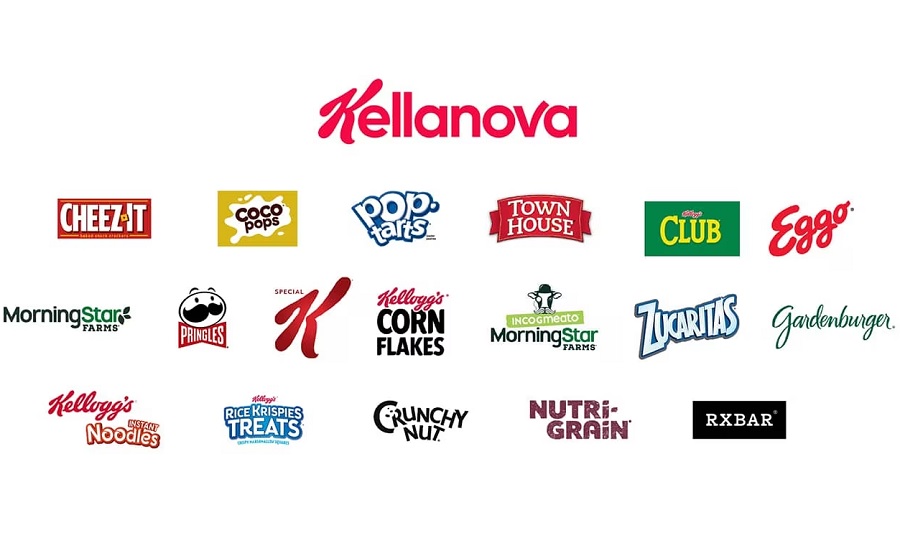Kellanova's Seasonal Snacks and Financial Movements

- Kellanova (NYSE:K) introduces limited-edition summer snacks and products across its iconic brands.
- The KELLOGG W K FOUNDATION TRUST sells 114,583 shares, yet Kellanova's market position remains strong with a market capitalization of approximately $28.27 billion.
- New plant-based and seasonal offerings aim to enhance summer celebrations and support Kellanova's commitment to equitable food access.
Kellanova (NYSE:K) is making a splash this summer with a range of seasonal snacks and products. Known for its iconic brands like Cheez-Its®, Pringles®, Pop-Tarts®, and Eggo®, the company is introducing limited-edition items and festive packaging to enhance summer celebrations. Cheez-It is gaining attention with its Flag Summer crackers and a special collaboration with Palermo's Pizza, available for a limited time.
In the financial realm, the KELLOGG W K FOUNDATION TRUST, a significant shareholder, recently sold 114,583 shares at approximately $81.89 each. Despite this transaction, the trust still holds 46.36 million shares. The stock is currently priced at $81.48, reflecting a slight decrease of 0.63% today, with a trading range between $81.40 and $81.63.
Pringles is embracing the season with patriotic packaging, perfect for on-the-go snacking. Pop-Tarts is launching Ice Cream Sandwiches and new Ice Cream Pints in flavors like Frosted Strawberry and Brown Sugar Cinnamon, along with a branded pool floatie for stylish lounging. Eggo is offering Ice Cream Sandwiches and Pints in flavors such as Buttery Maple and Chocolate Chip, alongside new Pancake Birthday Cake Pouched Minis for convenient snacking.
Kellanova's stock has seen a 52-week high of $83.22 and a low of $55.96, with a market capitalization of approximately $28.27 billion. The trading volume today is 3,233,827 shares. Despite the recent stock price dip, Kellanova remains a leader in global snacking and North American frozen foods, with net sales of $13 billion in 2023.
MorningStar Farms is heating up the grill with its plant-based Sizzlin' Steakhouse Burgers, adding a savory twist to summer barbecues. Rice Krispies Treats is also joining the summer fun with a lineup of seasonal specials. Kellanova is committed to creating better days and ensuring equitable food access, aiming to impact 4 billion people by 2030.
| Symbol | Price | %chg |
|---|---|---|
| HSY.BA | 11890 | -2.02 |
| YUPI.JK | 1675 | -0.6 |
| 271560.KS | 103600 | 1.83 |
| 00499K.KS | 29750 | -1.34 |

Kellanova Shares Surge 14% on Report of Potential Acquisition by Mars
Shares of Kellanova (NYSE:K) surged over 14% on Monday following a Reuters report that Mars, the family-owned food giant famous for brands like M&M's and Snickers, is considering acquiring the snack maker.
If the acquisition proceeds, it would represent one of the largest deals in the packaged food sector, with Kellanova's market value around $27 billion, including debt. Despite a 28% rise in Kellanova's shares this year, the company had been trading at a discount compared to industry peers like Hershey and Mondelez International, making it an attractive acquisition target.
However, sources cited by Reuters cautioned that there is no guarantee Kellanova will reach a deal with Mars. Other potential buyers could emerge, and there remains the possibility that no agreement will be finalized.
The potential deal underscores the ongoing trend of robust mergers and acquisitions in the packaged food industry as companies seek to scale up and combat price inflation. For Mars, acquiring Kellanova would mark its largest purchase ever, surpassing its $9.1 billion acquisition of veterinary hospital operator VCA in 2017.

Kellanova Shares Surge 14% on Report of Potential Acquisition by Mars
Shares of Kellanova (NYSE:K) surged over 14% on Monday following a Reuters report that Mars, the family-owned food giant famous for brands like M&M's and Snickers, is considering acquiring the snack maker.
If the acquisition proceeds, it would represent one of the largest deals in the packaged food sector, with Kellanova's market value around $27 billion, including debt. Despite a 28% rise in Kellanova's shares this year, the company had been trading at a discount compared to industry peers like Hershey and Mondelez International, making it an attractive acquisition target.
However, sources cited by Reuters cautioned that there is no guarantee Kellanova will reach a deal with Mars. Other potential buyers could emerge, and there remains the possibility that no agreement will be finalized.
The potential deal underscores the ongoing trend of robust mergers and acquisitions in the packaged food industry as companies seek to scale up and combat price inflation. For Mars, acquiring Kellanova would mark its largest purchase ever, surpassing its $9.1 billion acquisition of veterinary hospital operator VCA in 2017.

Kellogg's Cereal Unit Sees Notable Rally Post-Spinoff from Kellanova
Kellogg's cereal unit, recently spun off from Kellanova, has seen a notable rally, moving away from its previously undervalued status. This resurgence, however, is met with skepticism regarding its sustainability. The financial metrics of Kellogg's (K) listed on the NYSE, provide a deeper insight into this situation. With a price-to-earnings (P/E) ratio of approximately 23.10, it shows that investors are currently willing to pay $23.10 for every dollar of earnings the company makes, suggesting optimism about the company's future profitability. This optimism is further reflected in the price-to-sales (P/S) ratio of about 1.48, indicating that investors value each dollar of the company's sales at nearly one and a half times.
The enterprise value to sales (EV/Sales) ratio of roughly 1.93 and the enterprise value to operating cash flow (EV/OCF) ratio of approximately 15.96 provide additional layers of understanding regarding Kellogg's valuation. The EV/Sales ratio underlines the company's overall valuation in relation to its sales, while the EV/OCF ratio offers a glimpse into how the market values the company against its operating cash flows. These ratios suggest that the market has a relatively positive view of Kellogg's financial health and its ability to generate cash from its operations.
However, the financial leverage and liquidity of Kellogg's, as indicated by its debt-to-equity (D/E) ratio of about 2.09 and a current ratio of approximately 0.62, respectively, paint a more nuanced picture. The D/E ratio, which measures the company's financial leverage, indicates that Kellogg's has more than twice as much debt as equity. This level of debt could be a concern for the company's financial stability, especially if it faces challenges in generating sufficient profits. On the other hand, the current ratio, which is a measure of a company's ability to pay off its short-term liabilities with its short-term assets, suggests potential liquidity challenges. A ratio under 1, like Kellogg's 0.62, signals that the company might struggle to meet its short-term obligations, which could be a red flag for investors.
In the context of Kellanova's groundbreaking collaboration with Mike's Hot Honey, introducing a new flavor to its Club Crisps lineup, these financial metrics become particularly relevant. This partnership, aimed at tapping into the growing 'Swicy' snacking trend, reflects an innovative approach to expanding Kellogg's product offerings and potentially boosting its sales and profitability. The collaboration's success could play a crucial role in sustaining Kellogg's recent market rally by appealing to consumer preferences for unique flavor profiles and contributing positively to the company's sales figures. However, the financial leverage and liquidity concerns highlighted by the D/E and current ratios, respectively, underscore the importance of closely monitoring Kellogg's financial health as it navigates this new venture.

Kellogg Earns an Upgrade at Bernstein
Bernstein analysts upgraded Kellogg (NYSE:K) to Market Perform from Underperform, maintaining their $62 price target. The analysts find the stock's valuation "seriously attractive," trading at a 5-year low and 15-year low relative to its U.S. Food peers.
Since the announcement of its divestment one year ago, Kellogg's stock has exhibited weaker performance compared to its U.S. Food peers, with a decline of 15%, and its primary competitor GIS, with a decline of 26%.
Despite underperforming peers and a spin-off (its North American cereal business) creating uncertainty, analysts believe investors have overlooked Kellogg's improved earnings outlook.

Kellogg Earns an Upgrade at Bernstein
Bernstein analysts upgraded Kellogg (NYSE:K) to Market Perform from Underperform, maintaining their $62 price target. The analysts find the stock's valuation "seriously attractive," trading at a 5-year low and 15-year low relative to its U.S. Food peers.
Since the announcement of its divestment one year ago, Kellogg's stock has exhibited weaker performance compared to its U.S. Food peers, with a decline of 15%, and its primary competitor GIS, with a decline of 26%.
Despite underperforming peers and a spin-off (its North American cereal business) creating uncertainty, analysts believe investors have overlooked Kellogg's improved earnings outlook.

Kellogg’s Upcoming Q1 Earnings Preview
RBC Capital analysts provided their outlook on Kellogg Company (NYSE:K) ahead of the upcoming Q1/23 earnings, which are scheduled to be released on Thursday.
The analysts expect adjusted EPS of $0.99 for Q1/23, in line with the Street estimate. Overall, the analysts expect Kellogg to clear the consensus bar this quarter (and note that consensus is already at the higher end of the company’s full-year guidance).
Given strong beat-and-raises across the board from packaged food competitors, the analysts see the possibility for Kellogg to be able to reaffirm or raise its guidance this quarter. However, if guidance is raised, it will be on the basis of a strong Q1 and likely will not materially change the outlook for the balance of the year as the company laps difficult comps and faces macro uncertainty.







